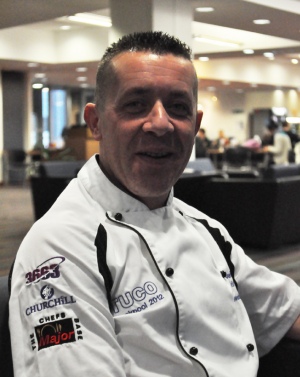Imperial Chefs Prepare for Fine Dining Cook Off

Next month, Senior Sous Chef, Steve Robertson, will compete in the University Caterers Organisation (TUCO) Chef's Challenge for the eighth time.
This year Steve competes with colleague and Sous Chef, Stevan Bedward in a ‘Masterchef-style’ revamped challenge format and shares his thoughts on the competition.
Entry to this competition is open to 24 teams of two from TUCO member universities and colleges. Taking place on 17 and 18 March at the Blackpool and Fylde College, competitors are required to design and cook a three-course meal from a box of ingredients presented to them.
Team members will have the ingredients revealed to them on Monday 17 March when they will have two hours to design a menu suitable for fine dining. They’ll need to provide a breakdown of each course, creating a basic ’shopping list’ of each indicating how much of what ingredient they’ll require in addition to a basic sketch of how they’ll present the final dishes when they cook the following day.
Previous competitions involved three team members cooking a practiced four course fine dining menu. Few restrictions were placed on team members bringing an array of equipment they may need. This year, they will be required to use what’s on offer and may only bring up to two additional equipment items from their own kitchens.

Senior Sous Chef Steve Robertson
What would be your dream / nightmare ingredients?
Anything we haven’t worked with a lot would be a nightmare – sea urchins spring to mind! If the organisers are thinking like chefs, I imagine the box will include plenty of seasonal ingredients so rhubarb, spring onions and blood oranges would be great as would venison or sea bass.
How would you describe your style of cooking?
Modern British, easy on the eye and not overcomplicated. Too many ingredients on the plate can be confusing so I’ll try and keep that in mind when we’re faced with the box of ingredients at TUCO!
How do you feel about this new competition format?
It’s definitely going to be challenging, as you can’t do as much preparation and you really are hoping for the best on the day. Having said that, it opens up the field a bit more, which makes the competition more exciting, and having had seven previous competitions to draw on I’m probably as prepared as I’ll ever be!
What's your game plan for success?
We’ve been doing a little ‘virtual blind box’ preparation and practicing menu planning and recipe breakdowns. We need to remember to keep the menu simple and show that we understand the ingredients through our planning. Focus on flavours, textures, seasoning and clean presentation. We’ll also need to remember to have hot plates at the ready!
Any competition to be wary of?
Exeter have won gold for the last two years so they’re definitely a team to watch. Kent, York and Birmingham have all also been very strong recently but I really do think this new format could means it’s anybody’s to win.
What's your best and worst memory of the competition so far?
The worst has to be our second competition in 2008 when we didn’t win a thing. The day was a disaster from the start with lots of elements going wrong and equipment failing. It just wasn’t our day but it did make us work hard for the next one and it taught us not to assume that equipment is the same everywhere. It showed how important it was to use cooking techniques, which don’t rely as heavily on equipment and started using more molecular techniques - working hard to minimise the impact of uncontrollable factors. The hard work and change of tactics paid off, as we won Gold in 2009 – most definitely my favourite memory and a very proud moment.
Why is this competition important to you and the team?
It’s a great opportunity to meet other chefs in a similar position and to network and share best practice. It’s also a chance to put Imperial’s catering on the map and show just what we can do.
Article text (excluding photos or graphics) © Imperial College London.
Photos and graphics subject to third party copyright used with permission or © Imperial College London.
Reporter
Press Office
Communications and Public Affairs
- Email: press.office@imperial.ac.uk
